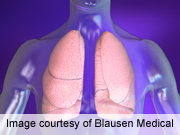
WEDNESDAY, April 4 (HealthDay News) — A new therapeutic vaccine appears to lengthen the lives of patients with a certain type of lung cancer, according to results of a small phase 2 trial.
The drug, belagenpumatucel-L (Lucanix), extended the lives of patients with nonprogressive non-small cell lung cancer and increased the five-year survival rate among some patients with moderately advanced cancer to 50 percent, researchers found.
For the study, 75 patients with stage 2, 3A, 3B or 4 cancer were randomly assigned to various doses of the vaccine, which was derived from four lung cancer cell lines. Staging refers to the severity of cancer. A stage 3 cancer has spread nearby, while a stage 4 cancer has spread to another organ.
Overall, the patients survived an average of 14.5 months and the five-year survival rate was 20 percent, lead researcher Dr. Lyudmila Bazhenova, an associate clinical professor at the University of California, San Diego Moores Cancer Center in La Jolla, and colleagues noted.
Patients with stage 3B and stage 4 disease who were given the two highest doses of the vaccine survived an average of 15.9 months. In these patients, average one-year survival rates were 61 percent, two-year survival rates averaged 41 percent and five-year survival rates were 18 percent.
But after chemotherapy, vaccinated patients with stage 3B or stage 4 nonprogressive cancer had an average survival of 44.4 months and five-year survival was 50 percent, which is “unheard of for patients with non-small cell lung cancer,” Bazhenova said in a news release from the American Association for Cancer Research.
Patients whose disease progressed after chemotherapy survived an average of 14 months and had a 9 percent five-year survival rate, the researchers reported.
“This is a novel immunotherapy that appears to show unusually long survival in some patients,” Bazhenova stated in the news release. The study authors also noted that a phase 3 clinical trial to confirm the results is currently under way in eight countries.
Commenting on the findings, Dr. Norman Edelman, chief medical officer of the American Lung Association, said: “This is a most interesting and potentially important study, as improving the survival rates of patients with relatively advanced lung cancer remains an important but difficult-to-achieve goal.”
Vaccines to treat cancer have been around for a while with rather modest success so far, he said.
“While it is too early to call this study a breakthrough, it certainly is quite promising,” added Edelman, who was not involved in the study.
A “randomized” trial — one that randomly assigns patients to receive either the active vaccine or an inactive vaccine — is needed to determine the real benefit of the therapy before it can be used to treat patients, however, Edelman noted.
“It is important to understand that this is prolongation of life and not a cure,” Edelman said. “If the randomized trial confirms the findings, the approach will represent a significant contribution to the management of more advanced lung cancers.”
The study findings were slated for presentation Wednesday at the American Association for Cancer Research annual meeting in Chicago.
Because this study was presented at a medical meeting, the data and conclusions should be viewed as preliminary until published in a peer-reviewed journal.
More information
For more about lung cancer, visit the U.S. National Cancer Institute.

